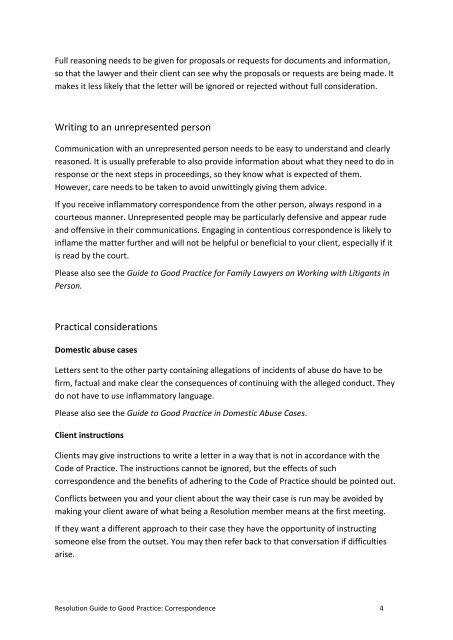Guide to Good Practice on Correspondence
good_practice_guide_correspondence
good_practice_guide_correspondence
Create successful ePaper yourself
Turn your PDF publications into a flip-book with our unique Google optimized e-Paper software.
Full reas<strong>on</strong>ing needs <str<strong>on</strong>g>to</str<strong>on</strong>g> be given for proposals or requests for documents and informati<strong>on</strong>,<br />
so that the lawyer and their client can see why the proposals or requests are being made. It<br />
makes it less likely that the letter will be ignored or rejected without full c<strong>on</strong>siderati<strong>on</strong>.<br />
Writing <str<strong>on</strong>g>to</str<strong>on</strong>g> an unrepresented pers<strong>on</strong><br />
Communicati<strong>on</strong> with an unrepresented pers<strong>on</strong> needs <str<strong>on</strong>g>to</str<strong>on</strong>g> be easy <str<strong>on</strong>g>to</str<strong>on</strong>g> understand and clearly<br />
reas<strong>on</strong>ed. It is usually preferable <str<strong>on</strong>g>to</str<strong>on</strong>g> also provide informati<strong>on</strong> about what they need <str<strong>on</strong>g>to</str<strong>on</strong>g> do in<br />
resp<strong>on</strong>se or the next steps in proceedings, so they know what is expected of them.<br />
However, care needs <str<strong>on</strong>g>to</str<strong>on</strong>g> be taken <str<strong>on</strong>g>to</str<strong>on</strong>g> avoid unwittingly giving them advice.<br />
If you receive inflamma<str<strong>on</strong>g>to</str<strong>on</strong>g>ry corresp<strong>on</strong>dence from the other pers<strong>on</strong>, always resp<strong>on</strong>d in a<br />
courteous manner. Unrepresented people may be particularly defensive and appear rude<br />
and offensive in their communicati<strong>on</strong>s. Engaging in c<strong>on</strong>tentious corresp<strong>on</strong>dence is likely <str<strong>on</strong>g>to</str<strong>on</strong>g><br />
inflame the matter further and will not be helpful or beneficial <str<strong>on</strong>g>to</str<strong>on</strong>g> your client, especially if it<br />
is read by the court.<br />
Please also see the <str<strong>on</strong>g>Guide</str<strong>on</strong>g> <str<strong>on</strong>g>to</str<strong>on</strong>g> <str<strong>on</strong>g>Good</str<strong>on</strong>g> <str<strong>on</strong>g>Practice</str<strong>on</strong>g> for Family Lawyers <strong>on</strong> Working with Litigants in<br />
Pers<strong>on</strong>.<br />
Practical c<strong>on</strong>siderati<strong>on</strong>s<br />
Domestic abuse cases<br />
Letters sent <str<strong>on</strong>g>to</str<strong>on</strong>g> the other party c<strong>on</strong>taining allegati<strong>on</strong>s of incidents of abuse do have <str<strong>on</strong>g>to</str<strong>on</strong>g> be<br />
firm, factual and make clear the c<strong>on</strong>sequences of c<strong>on</strong>tinuing with the alleged c<strong>on</strong>duct. They<br />
do not have <str<strong>on</strong>g>to</str<strong>on</strong>g> use inflamma<str<strong>on</strong>g>to</str<strong>on</strong>g>ry language.<br />
Please also see the <str<strong>on</strong>g>Guide</str<strong>on</strong>g> <str<strong>on</strong>g>to</str<strong>on</strong>g> <str<strong>on</strong>g>Good</str<strong>on</strong>g> <str<strong>on</strong>g>Practice</str<strong>on</strong>g> in Domestic Abuse Cases.<br />
Client instructi<strong>on</strong>s<br />
Clients may give instructi<strong>on</strong>s <str<strong>on</strong>g>to</str<strong>on</strong>g> write a letter in a way that is not in accordance with the<br />
Code of <str<strong>on</strong>g>Practice</str<strong>on</strong>g>. The instructi<strong>on</strong>s cannot be ignored, but the effects of such<br />
corresp<strong>on</strong>dence and the benefits of adhering <str<strong>on</strong>g>to</str<strong>on</strong>g> the Code of <str<strong>on</strong>g>Practice</str<strong>on</strong>g> should be pointed out.<br />
C<strong>on</strong>flicts between you and your client about the way their case is run may be avoided by<br />
making your client aware of what being a Resoluti<strong>on</strong> member means at the first meeting.<br />
If they want a different approach <str<strong>on</strong>g>to</str<strong>on</strong>g> their case they have the opportunity of instructing<br />
some<strong>on</strong>e else from the outset. You may then refer back <str<strong>on</strong>g>to</str<strong>on</strong>g> that c<strong>on</strong>versati<strong>on</strong> if difficulties<br />
arise.<br />
Resoluti<strong>on</strong> <str<strong>on</strong>g>Guide</str<strong>on</strong>g> <str<strong>on</strong>g>to</str<strong>on</strong>g> <str<strong>on</strong>g>Good</str<strong>on</strong>g> <str<strong>on</strong>g>Practice</str<strong>on</strong>g>: Corresp<strong>on</strong>dence 4


